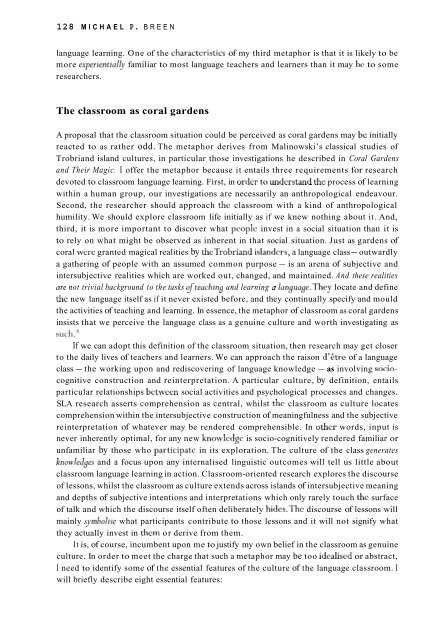English Language Teaching in its Social Context
English Language Teaching in its Social Context
English Language Teaching in its Social Context
You also want an ePaper? Increase the reach of your titles
YUMPU automatically turns print PDFs into web optimized ePapers that Google loves.
theas128 MICHAEL P. BREENlanguage learn<strong>in</strong>g. One of the characteristics of my third metaphor is that it is likely to bemore expenentially familiar to most language teachers and learners than it may be to someresearchers.The classroom as coral gardensA proposal that the classroom situation could be perceived as coral gardens may be <strong>in</strong>itiallyreacted to as rather odd. The metaphor derives from Mal<strong>in</strong>owski’s classical studies ofTrobriand island cultures, <strong>in</strong> particular those <strong>in</strong>vestigations he described <strong>in</strong> Coral Gardensand Their Magic. I offer the metaphor because it entails three requirements for researchdevoted to classroom language learn<strong>in</strong>g. First, <strong>in</strong> order to understand the process of learn<strong>in</strong>gwith<strong>in</strong> a human group, our <strong>in</strong>vestigations are necessarily an anthropological endeavour.Second, the researcher should approach the classroom with a k<strong>in</strong>d of anthropologicalhumility. We should explore classroom life <strong>in</strong>itially as if we knew noth<strong>in</strong>g about it. And,third, it is more important to discover what people <strong>in</strong>vest <strong>in</strong> a social situation than it isto rely on what might be observed as <strong>in</strong>herent <strong>in</strong> that social situation. Just as gardens ofcoral were granted magical realities by thcTrobriand islanders, a language class ~ outwardlya gather<strong>in</strong>g of people with an assumed common purpose ~ is an arena of subjective and<strong>in</strong>tersubjective realities which are worked out, changed, and ma<strong>in</strong>ta<strong>in</strong>ed. And these realitiesme not trivial background to the tasks ofteach<strong>in</strong>g and learn<strong>in</strong>g CI language.They locate and def<strong>in</strong>ethe new language <strong>its</strong>elf as if it never existed before, and they cont<strong>in</strong>ually specify and mouldthe activities of teach<strong>in</strong>g and learn<strong>in</strong>g. In essence, the metaphor of classroom as coral gardens<strong>in</strong>sists that we perceive the language class as a genu<strong>in</strong>e culture and worth <strong>in</strong>vestigat<strong>in</strong>g assuch.XIf we can adopt this def<strong>in</strong>ition of the classroom situation, then research may get closerto the daily lives of teachers and learners. We can approach the raison d’etre of a languageclass ~ work<strong>in</strong>g upon and rediscover<strong>in</strong>g of language knowledge ~ <strong>in</strong>volv<strong>in</strong>g sociocognitiveconstruction and re<strong>in</strong>terpretation. A particular culture, by def<strong>in</strong>ition, entailsparticular relationships between social activities and psychological processes and changes.SLA research asserts comprehension as central, whilst the classroom as culture locatescomprehension with<strong>in</strong> the <strong>in</strong>tersubjective construction of mean<strong>in</strong>gfulness and the subjectivere<strong>in</strong>terpretation of whatever may be rendered comprehensible. In other words, <strong>in</strong>put isnever <strong>in</strong>herently optimal, for any new knowlcdgc is socio-cognitively rendered familiar orunfamiliar by those who participate <strong>in</strong> <strong>its</strong> exploration. The culture of the class generatesknowledges and a focus upon any <strong>in</strong>ternalised l<strong>in</strong>guistic outcomes will tell us little aboutclassroom language learn<strong>in</strong>g <strong>in</strong> action. Classroom-oriented research explores the discourseof lessons, whilst the classroom as culture extends across islands of <strong>in</strong>tersubjective mean<strong>in</strong>gand depths of subjective <strong>in</strong>tentions and <strong>in</strong>terpretations which only rarely touch the surfaceof talk and which the discourse <strong>its</strong>elf often deliberately hides.The discourse of lessons willma<strong>in</strong>ly ymbolise what participants contribute to those lessons and it will not signify whatthey actually <strong>in</strong>vest <strong>in</strong> them or derive from them.It is, of course, <strong>in</strong>cumbent upon me to justify my own belief <strong>in</strong> the classroom as genu<strong>in</strong>eculture. In order to meet the charge that such a metaphor may be too idealiscd or abstract,I need to identify some of the essential features of the culture of the language classroom. Iwill briefly describe eight essential features:












